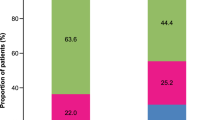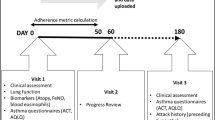Abstract
Aims:
To explore the utility of self-report measures of inhaled corticosteroid (ICS) adherence, degree of rhinitis and smoking status and their association with asthma control.
Methods:
Patients prescribed ICS for asthma at 85 UK practices were sent validated questionnaire measures of control (Asthma Control Questionnaire; ACQ) and adherence (Medication Adherence Report Scale), a two-item measure of smoking status, and a single-item measure of rhinitis.
Results:
Complete anonymised questionnaires were available for 3916 participants. Poor asthma control (ACQ >1.5) was associated with reported rhinitis (OR = 4.62; 95% CI: 3.71-5.77), smoking (OR = 4.33; 95%&S3.58-5.23) and low adherence to ICS (OR = 1.35; 95% CI: 1.18-1.55). The degree of rhinitis was important, with those reporting severe rhinitis exhibiting the worst asthma control, followed by those reporting mild rhinitis and then those reporting no rhinitis symptoms (F(2, 3913)=128.7, p<.001). There was a relationship between the number of cigarettes smoked each day and asthma control (F(5,655)=6.08, p<.001).
Conclusions:
Poor asthma control is associated with self-reported rhinitis, smoking and low medication adherence. These potentially modifiable predictors of poor asthma control can be identified through a brief self-report questionnaire, used routinely as part of an asthma review.
Similar content being viewed by others
Article PDF
Author information
Authors and Affiliations
Corresponding author
Ethics declarations
Competing interests
DP has consultant arrangements with, Aerocrine, Boehringer Ingelheim, GlaxoSmithKline, Merck generics, Merck, Sharpe and Dohme, Schering-Plough and Teva. He or his team have received grants and research support for research in respiratory disease from the following organisations: UK National Health Service, Aerocrine, AstraZeneca, Boehringer Ingelheim, GlaxoSmithKline, Merck, Sharpe and Dohme, Novartis, Pfizer, Schering Plough and Teva. He has spoken for: Boehringer Ingelheim, GlaxoSmithKline, Merck, Sharpe and Dohme and Pfizer. He is director of Optimum Patient Care Ltd.
Rights and permissions
About this article
Cite this article
Clatworthy, J., Price, D., Ryan, D. et al. The value of self-report assessment of adherence, rhinitis and smoking in relation to asthma control. Prim Care Respir J 18, 300–305 (2009). https://doi.org/10.4104/pcrj.2009.00037
Received:
Revised:
Accepted:
Published:
Issue date:
DOI: https://doi.org/10.4104/pcrj.2009.00037
This article is cited by
-
Allergic rhinitis and asthma symptoms in a real-life study of MP-AzeFlu to treat multimorbid allergic rhinitis and asthma
Clinical and Molecular Allergy (2020)
-
Planned primary health care asthma contacts during 12-year follow-up after Finnish National Asthma Programme: focus on spirometry
npj Primary Care Respiratory Medicine (2020)
-
African Americans Want a Focus on Shared Decision-Making in Asthma Adherence Interventions
The Patient - Patient-Centered Outcomes Research (2020)
-
Determinants of poorly controlled asthma among asthmatic patients in Jimma University Medical Center, Southwest Ethiopia: a case control study
BMC Research Notes (2019)
-
Modelling the asthma phenotype: impact of cigarette smoke exposure
Respiratory Research (2018)



